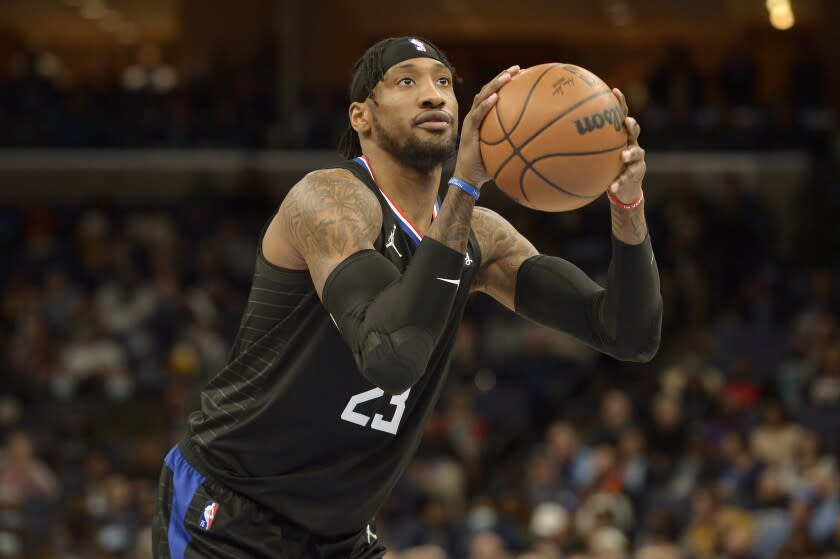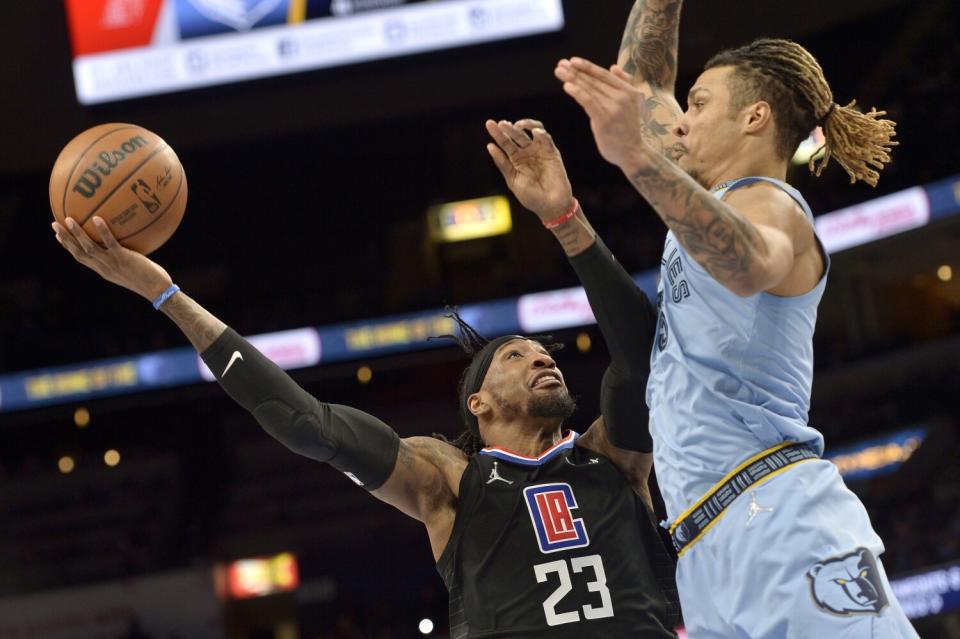'It can eat you': Clippers' Robert Covington has learned to prioritize mental health

Blessed with arms that telescope far beyond his 6-foot-7 frame and large hands that strike as quickly as the snakes he has adored since childhood, Robert Covington had carved out a career by being a taker.
On his way from undrafted to NBA all-defense, the forward stole passes. He ended possessions. Each deflection, each timely rotation in help defense since his arrival in the NBA in 2014 could take away confidence from opponents.
But in 2019, hurt in more ways than one after a trade from Philadelphia to Minnesota in 2018, Covington believed he was giving away too much — from energy to his family and his friends and attention to the negativity he says is the curse that comes with the money and the fame of professional basketball.
“If you’re not in the right mental space, man … it can eat at you,” Covington said. “It can eat you.”
It was eating away in early 2019 in Minneapolis when Covington responded by doing what had forged his career. But this time, it was himself that he took away. The player whose gifts allowed him to cover up a defense’s shortcomings had no idea how to address his own. He considered whether it was time to leave the NBA life he’d worked so hard to reach.
“I snapped on people that were just trying to help me and I went into solitude by myself, kicked everybody out away from me, and was sitting in the loneliness,” he said. “Darkness, by myself. Me and my Cane Corso. He knew something was wrong, because he never left my side.
“When I had to have surgery, to repair my meniscus at that time, it just was going on and I was like, ‘What do I take? And how do I get out of this place?’ ”
The version of Covington the Clippers have known since his arrival Feb. 5 — via a trade from Portland that also brought Norman Powell to Los Angeles — is a product of his work in the three years since what he now calls his foundation. He is not only the player who, at 31, still possesses some of the NBA’s fastest hands, who is among the league leaders in deflections and who blocked four shots Tuesday against Houston in the Clippers’ fourth consecutive victory.
Three years after seeking professional help for “all the things I had going on in my head mentally,” he is as much a giver as a taker, a change seen not only in the energy he gives to teammates, although that has become a staple of his brief Clippers tenure.
“I like to keep people and those spirits high because I’ve been at a point where I’ve been frustrated and overwhelmed, and that s— takes a toll,” he said. “And at one point I was ready to walk away from this game.”

It is also, now, about the grace he allows himself.
“I take positives, I take negatives, and I just reevaluate,” he said. “I don’t let them drain my energy. I just assess it in a different manner, to where it helps me. And that’s what I’ll allow myself to get to, because before, I couldn’t do that.”
Covington had felt bombarded by questions well before injuring his knee nearly midway through the 2018-19 season. Months earlier, after hearing his name attached to trade rumors, he had felt assured from Philadelphia executives that his future was with the 76ers. But then he was traded to Minnesota, and he told the Minneapolis Star-Tribune in 2019 that he felt betrayed “in a sense, yes, just because I had asked.”
Then his knee did not heal on its original timeline. Covington began increasingly keeping to himself and showing little enthusiasm for rehab before he “snapped.” The Timberwolves asked for a sit-down talk.
It was encouragement from his then-Timberwolves coach, Ryan Saunders — who had seen a therapist after the death of his father, Flip, a longtime NBA coach and executive — that led Covington to find help in someplace other than self-imposed solitude.
Before Covington could play again, let alone at a level that has left his new teammates singing praise, he had to fix not only his knee but also his tendency to prioritize others’ needs while deflecting his own.
“I was too busy helping everybody to try and do everything for them, instead of working on how do I help myself, because I’ve realized that my biggest quality, one of my biggest flaws, is I try to make sure everyone else around me is good before I make sure myself is good,” he said.
“But when I retrained that, and made sure I was good first mentally, then I was able to help others in a different manner compared to just pouring out into others and not pouring into myself. So that’s what I learned mostly. And that’s really what was causing a lot of the trauma and a lot of the pain that I was going through.”
Covington’s reason to continue, he said, was his family watching him play a game he knew he was not ready to leave. The Clippers (33-31) are glad he did not as his defense has helped the Clippers rank in the top three in the NBA since the trade deadline, with Nicolas Batum, also one of the league’s most versatile defenders, calling Covington’s hands as fast, if not faster, than Kawhi Leonard’s.
Within a league where mental health awareness is now championed but where its stigma is not yet erased — some still hold their stories of depression close, not ready to be shared — Covington has recounted his story publicly during stops in Minnesota and Portland. And it happened again Tuesday, in a small room in Houston’s Toyota Center, where his postgame thoughts quickly turned to a spilling of his soul.
“I’ve been there brother,” Batum replied to a Twitter post of Covington’s comments. “Glad you on the team and you didn’t give up.”
Lakers vs. Clippers
When: Thursday, 7 p.m.
On the air: TV: TNT; Radio: 570, 710, 1330, 1220
Update: Since these teams last met, the Clippers have won their last two games and the Lakers lost their last two to create a gap of 4½ games between them in eighth and ninth place, respectively, in the West. The Clippers have committed just two turnovers in 13 “clutch” minutes against the Lakers this season. Forward Marcus Morris Sr. is four-for-four shooting and Luke Kennard three-for-three in such late-game scenarios when the team scores are within five points.
This story originally appeared in Los Angeles Times.

